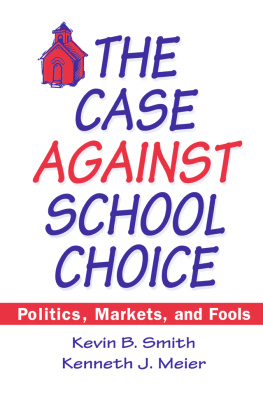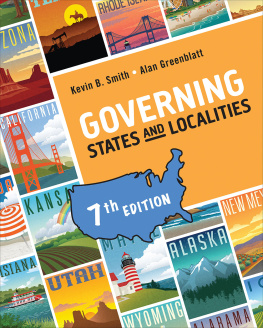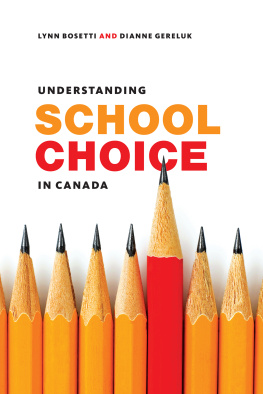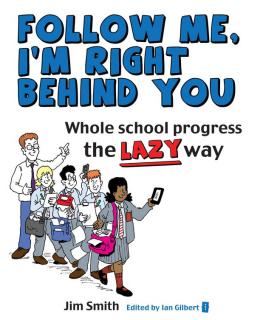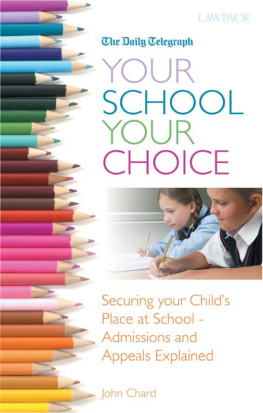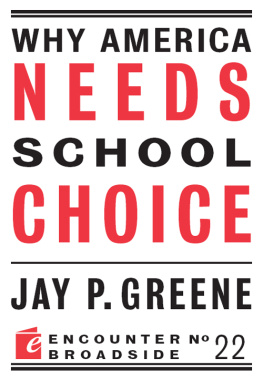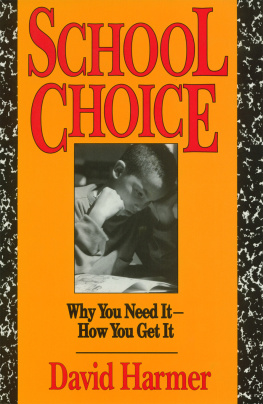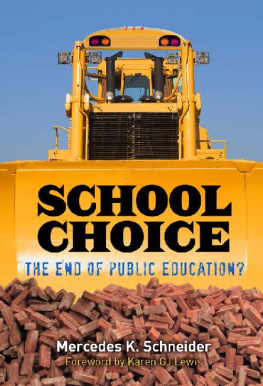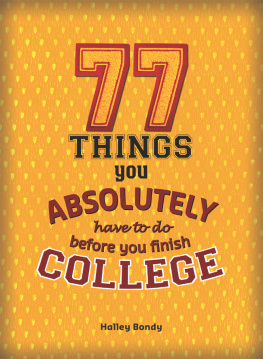THE CASE AGAINST SCHOOL CHOICE
The Case Against School Choice
Politics, Markets, and Fools
Kevin B. Smith
Kenneth J. Meier
First published 1995 by M.E. Sharpe
Published 2015 by Routledge
2 Park Square, Milton Park, Abingdon, Oxon OX14 4RN
711 Third Avenue, New York, NY 10017, USA
Routledge is an imprint of the Taylor & Francis Group, an informa business
Copyright 1995 Taylor & Francis. All rights reserved.
No part of this book may be reprinted or reproduced or utilised in any form or by any electronic, mechanical, or other means, now known or hereafter invented, including photocopying and recording, or in any information storage or retrieval system, without permission in writing from the publishers.
Notices
No responsibility is assumed by the publisher for any injury and/or damage to persons or property as a matter of products liability, negligence or otherwise, or from any use of operation of any methods, products, instructions or ideas contained in the material herein.
Practitioners and researchers must always rely on their own experience and knowledge in evaluating and using any information, methods, compounds, or experiments described herein. In using such information or methods they should be mindful of their own safety and the safety of others, including parties for whom they have a professional responsibility.
Product or corporate names may be trademarks or registered trademarks, and are used only for identification and explanation without intent to infringe.
Library of Congress Cataloging-in-Publication Data
Smith, Kevin B., 1963
The case against school choice: politics, markets, and fools /
Kevin B. Smith and Kenneth J. Meier.
p. cm.
Includes bibliographical references and index.
ISBN 1-56324-519-1 (alk. paper). ISBN 1-56324-520-5 (pbk. : alk. paper)
1. School choiceWisconsinMilwaukeeCase studies.
I. Meier, Kenneth J., 1950 .II. Title
LB1027.9.S656 1995
371'.01dc20 94-33509
CIP
ISBN 13: 9781563245206 (pbk)
ISBN 13: 9781563245190 (hbk)
To Kelly and C.C.
Contents
|
|
|
Chapter Three. The Institutional Theory:
School Choice Revisited |
Chapter Seven. Fixin What Aint Broke:
Education Performance in the 1980s |
|
During the past decade school choice has emerged as a major focus of the education reform movement. Promising solutions to seemingly intractable problems, choice has been enthusiastically championed within and outside the education community. Most of these promises remain unfulfilled, and the ability of the education marketplace to rescue the nation's education system remains a theoretical rather than an empirical argument.
The purpose of this book is not to add to the impassioned ideological essays that are the main source of ammunition for the choice debate. We take the central theory of school choice, draw a list of testable hypotheses from that theory, and put those hypotheses to the empirical acid test. Our conclusions are controversial, and we would not be so disingenuous as to claim that we are merely humble scientists in search of truth who jettisoned the baggage of our own opinions. Still, while controversial, our findings are the result of a series of careful and objective research projectsmany revealed here for the first time and not the dogma of our own, or anybody else's, ideology. We conclude that the theory providing the rationale for school choice simply does not fit with reality. Instead of being a panacea, school choice has the potential to affect adversely the overall performance of America's education system.
Although both of us are data-oriented social scientists, we have attempted to make this book as accessible as possible. All the results of our more sophisticated statistical analyses are included in an appendix. We do not want to limit our audience to those with a certain level of expertise in number crunching. Accordingly, the body of the book can be read without reference to these tables and we hope will be informative reading for undergraduates, policymakers, and interested lay persons.
We begin our undertaking in attempts to bring together all the strands of our research into a cohesive explanation of where and why the main arguments supporting school choice have failed. The Epilogue concludes the book by bringing us back to where we startedthe classroom and the opinions of those who will be most affected by the outcomes of education reform.
Such an extensive project is rarely the product of two people's labor. We would like to thank the participants of various conference panels and the anonymous reviewers at various academic journals, who provided thoughtful criticism and guidance for the embryonic beginnings of this research. We would like to thank all those who were generous enough to share their time, their opinions, or their data. We would like to thank our wives, who for reasons unknown put up with us while we ignore them for projects such as this. While credit is rightly shared, error must be assigned to a single sourcePaul Saba-tier. For reasons shrouded in mystery, Paul has traditionally been assigned blame for all of Ken's mistakes. As both authors believe this to be a profitable and worthy arrangement, Paul now gets the blame for Kevin's boo-boos as well.
Kevin B. Smith
Kenneth J. Meier
One
The Hobgoblins of Education Policy
The whole aim of practical politics is to keep the populace alarmed (and hence clamorous to be led to safety) by menacing it with an endless series of hobgoblins, all of them imaginary .
H.L. Mencken
One of the most widely cited examples of America's education decline is a comparison of the top ten problems in public schools in the 1940s and the 1980s. In the 1940s the list was headed by talking, chewing gum, making noise, running in the halls, and cutting in line. In the 1980s these infractions had been replaced by drug and alcohol abuse, pregnancy, suicide, and rape.
As an example of the erosion of the nation's education infrastructure, the list has been used by conservatives and liberals alike. Former Secretary of Education William Bennett has quoted the list in his writings, as has columnist Anna Quindlen. The Wall Street Journal has printed the list, citing the Congressional Quarterly Researcher as a source. Former Surgeon General Joycelyn Elders used the list to promote the need for social programs. The list is not only widely quoted but also widely believed. It represents what much of the public perceives to be true about the public school system and its steady decline. This list is considered official, is largely unquestioned, and is held as proof incontrovertible of the decline of America's schools in the postwar era. But few realize that the list is based on one man's opinions, rather than any objective survey.
The list originated, not as social science or journalism, but as a rhetorical salvo from T. Cullen Davis, a born-again Christian and high-profile critic of public schools. He wrote the list based on his own He concludes that the listthere are several versionsrepresents a "collective moan of anxiety over the gap between ideals and reality" (O'Neill 1994,49). It also demonstrates how readily myth can replace reality in the volatile arena of public education.

